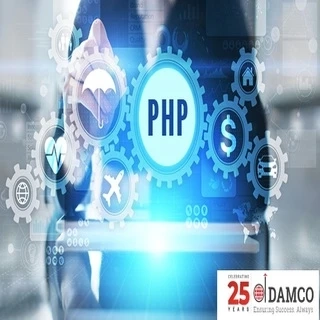Did you know? There were more than 1.88 billion websites as of 2021 and 175 new websites are developed every minute, which amounts to 252,000 new websites per day. This indicates that the demand for web development has been rising incessantly. When it comes to web development, there is a wide array of programming languages available ranging from JavaScript, CSS, HTML, and Python to C++, Angular, Typescript, SQL, and PHP. Amidst all, PHP is a popular server-side scripting language that is widely used for developing dynamic websites and web applications. This open-source programming language has been around for decades and it is still showing no signs of slowing down in the coming years. In fact, PHP powers 77.4% of all websites, according to W3Techs, and its usage share has remained constant in the last year. Furthermore, PHP is used by popular websites including Facebook, Zoom.us, Wikipedia, Canva, Flickr, MailChimp, WordPress, Yahoo, Etsy, Slack, and many more.
PHP has come a long way since its release and is considered a stable and secure programming language. To begin with, developers need to write tens of thousands of lines of code from scratch for developing custom functions, which is a laborious task. In some scenarios, developers need to write the same function multiple times, making the development process more time-intensive. Fortunately, PHP web development is no more time-consuming since there are many frameworks available that help developers cut down on the amount of code they need to write from scratch, which in turn, expedites the development process. Let’s dig deeper to understand better.
What is a PHP Framework?
A PHP framework is a boon for a PHP web development company since it offers a set of libraries, commonly used API functions, and ready-made components, which reduce the amount of effort required for web development. In other words, PHP frameworks provide a ready-made structure with well-organized and reusable codes that facilitate the quick development of websites and web applications. A PHP framework empowers web developers since they don\'t need to invest efforts in writing hundreds and thousands of lines of code from scratch. The fewer code developers need to write, the less time they need to develop custom functionalities for enterprise-grade solutions, which in turn, accelerates the development process.
After understanding the significance of frameworks in website and web application development, it becomes crucial to choose the best PHP framework for your next big project. Now, the dilemma is how to select the right web development framework, especially, when there are plenty of options available. To overcome this conundrum and make an informed decision, you should continue reading this informative post till the end.
4 Best PHP Web Development Frameworks to Consider in 2023
1) Laravel
Launched over a decade ago, Laravel is one of the popular frameworks with 71k stars and 23k Fork on GitHub. This free and open-source PHP framework is engineered by Taylor Otwell to simplify the web development process by easing routine development tasks including seamless data migration, user authentication, session management, caching, routing, queuing, and viewing template engine. For quite some time, Laravel has been topping the charts for its potential to handle complex full-stack development projects with unmatched speed and unbreachable security.
Key Features That Help Laravel Stand Out
- Clean syntax
- Built-in functions
- Plenty of features
- Supports MVC architecture
- Developer-friendly
- Highly expressive
- Powerful query library
- Email Integration system
- Laravel Artisan Console
- Laravel Homestead environment
- Large and helpful community
2) Symfony
Symfony is a reliable and mature platform that has been in existence since 2005. This free and open-source framework allows PHP development service providers to choose from 50+ reusable PHP components for quick web development. Built with MVC architecture, Symfony reduces the development time by eliminating additional coding requirements. Today, Symphony has become the first choice for large-scale enterprise projects owing to its versatility, configurability, and reusable libraries that allow web developers to perform an array of tasks like object configuration, templating, routing authentication, and form creation with ease.
Key Features That Help Symfony Stand Out
- Highly flexible
- Built-in debugging
- Twig template engine
- Excellent documentation
- Modular component system
- Support a diverse set of databases
- Allows integration with other vendor libraries
- Streamline APIs, microservices, and web application development
3) CodeIgniter
Renowned for its small footprint (a mere 2 MB in size, including the documentation), CodeIgniter is a lightweight PHP framework, which is used for building dynamic websites and web applications. This popular open-source framework proudly boasts 18k+ stars and 7k+ fork on GitHub. It offers a set of libraries and modules that help developers in crafting reusable and robust components to expedite the web development process.
It works seamlessly on both shared and dedicated hosting platforms and is considerably faster, unlike other PHP web development frameworks. Owing to its unmatched performance and blazing fast speed, PHP development service providers use this framework for developing lightweight applications that run seamlessly on simple servers.
Key Features That Help CodeIgniter Stand Out
- Hassle-free installation
- Minimalistic configuration
- Excellent documentation
- MVC architecture support
- Built-in security features
- Short learning curve
- Multiple caching methods
4) CakePHP
CakePHP is another popular open-source PHP framework that has been around for over a decade and is built with the model–view–controller (MVC) approach. Though this web development framework is more than a decade old, it is still gaining strong momentum with over 8k star and 3.5 fork on Github. The reason being is that each new version of this framework comes with the latest features that have kept its user base intact. For instance, the newly released version i.e. v4.0 comes with improved modularity, updated skeleton design, and APIs support to create standalone libraries that facilitate quick web application development. Lastly, this framework is considered ideal for commercial web application projects since it offers best-in-class security features such as cross-site scripting protection, cross-site request forgery protection, SQL injection prevention, and more.
Summing Up
PHP frameworks are designed to expedite the laborious and time-intensive web development process. Each web development framework comes with its own set of pros and cons, and they differ from one another in terms of documentation, community, and the database they support. Hopefully, after reading this insightful piece, you can choose the best PHP framework for your next web development project.
0


